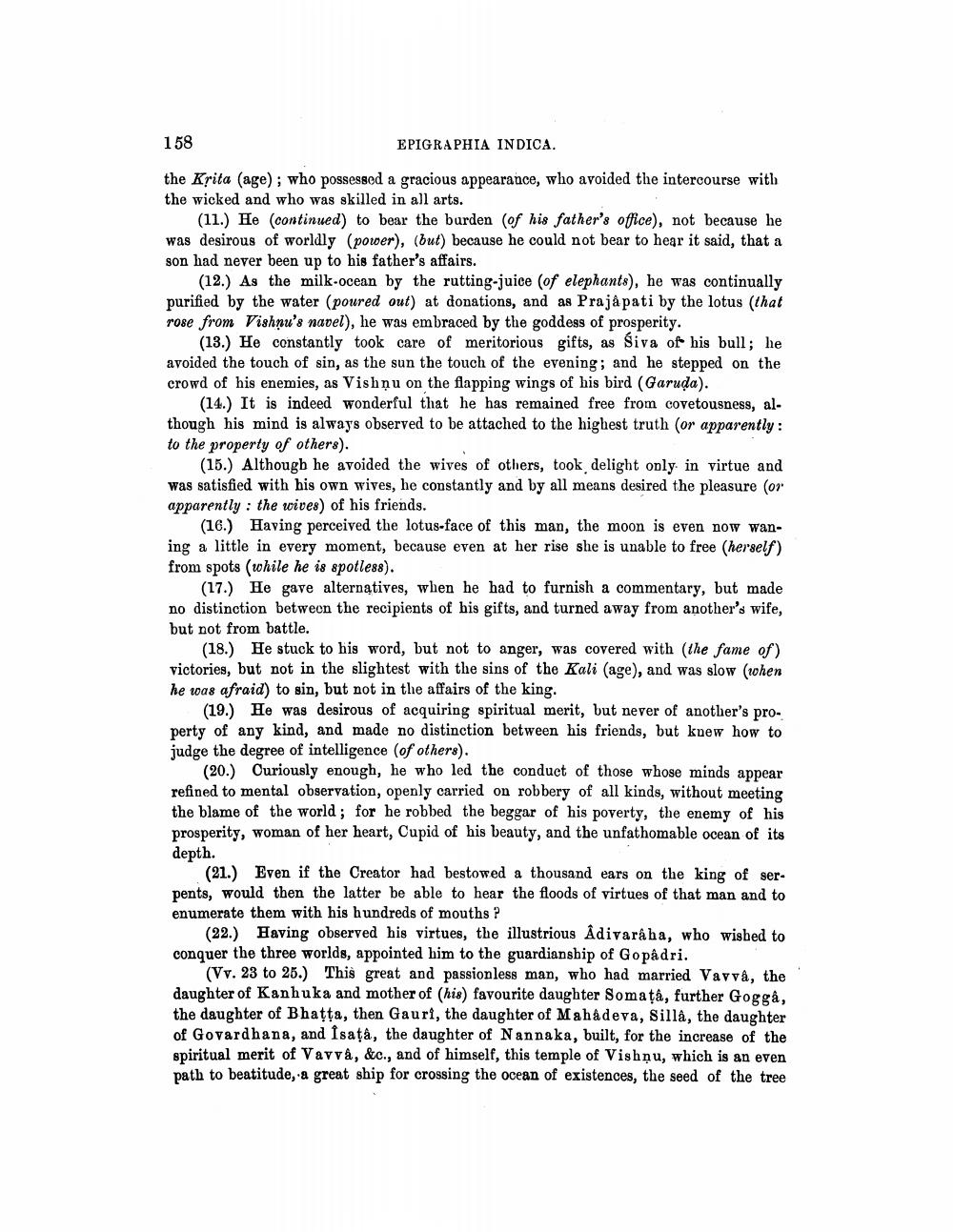________________
158
EPIGRAPHIA INDICA.
the Krita (age); who possessed a gracious appearance, who avoided the intercourse with the wicked and who was skilled in all arts.
(11.) He (continued) to bear the burden (of his father's office), not because he was desirous of worldly (power), (but) because he could not bear to hear it said, that a son had never been up to his father's affairs.
(12.) As the milk-ocean by the rutting-juice (of elephants), he was continually purified by the water (poured out) at donations, and as Prajapati by the lotus (that rose from Vishnu's navel), he was embraced by the goddess of prosperity.
(13.) He constantly took care of meritorious gifts, as Siva of his bull; he avoided the touch of sin, as the sun the touch of the evening; and he stepped on the crowd of his enemies, as Vishnu on the flapping wings of his bird (Garuda).
(14.) It is indeed wonderful that he has remained free from covetousness, although his mind is always observed to be attached to the highest truth (or apparently: to the property of others).
(15.) Although he avoided the wives of others, took delight only in virtue and was satisfied with his own wives, he constantly and by all means desired the pleasure (or apparently the wives) of his friends.
(16.) Having perceived the lotus-face of this man, the moon is even now waning a little in every moment, because even at her rise she is unable to free (herself) from spots (while he is spotless).
(17.) He gave alternatives, when he had to furnish a commentary, but made no distinction between the recipients of his gifts, and turned away from another's wife, but not from battle.
(18.) He stuck to his word, but not to anger, was covered with (the fame of) victories, but not in the slightest with the sins of the Kali (age), and was slow (when he was afraid) to sin, but not in the affairs of the king.
(19.) He was desirous of acquiring spiritual merit, but never of another's property of any kind, and made no distinction between his friends, but knew how to judge the degree of intelligence (of others).
(20.) Curiously enough, he who led the conduct of those whose minds appear refined to mental observation, openly carried on robbery of all kinds, without meeting the blame of the world; for he robbed the beggar of his poverty, the enemy of his prosperity, woman of her heart, Cupid of his beauty, and the unfathomable ocean of its depth.
(21.) Even if the Creator had bestowed a thousand ears on the king of serpents, would then the latter be able to hear the floods of virtues of that man and to enumerate them with his hundreds of mouths ?
(22.) Having observed his virtues, the illustrious Âdivarâha, who wished to conquer the three worlds, appointed him to the guardianship of Gopâdri.
(Vv. 23 to 25.) This great and passionless man, who had married Vavvâ, the daughter of Kanhuka and mother of (his) favourite daughter Somatâ, further Goggâ, the daughter of Bhaṭṭa, then Gauri, the daughter of Mahadeva, Sillâ, the daughter of Govardhana, and Îsatâ, the daughter of Nannaka, built, for the increase of the spiritual merit of Vavvâ, &c., and of himself, this temple of Vishnu, which is an even path to beatitude, a great ship for crossing the ocean of existences, the seed of the tree




